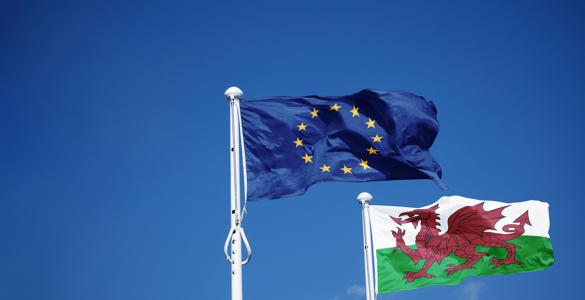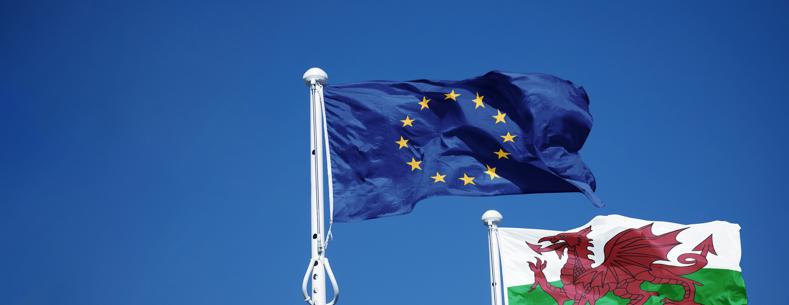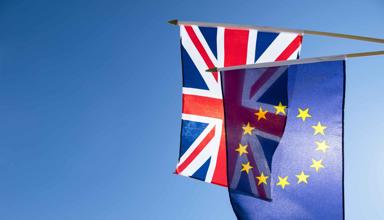|
On 5 November 2025 Plenary will debate a report from four Senedd committees on the UK-EU implementation review of the Trade and Cooperation Agreement. |
Since 2021, UK-EU relations are based on several agreements.
The main treaty is the Trade and Cooperation Agreement (TCA). Its 2,500-plus pages govern a multitude of important aspects of everyday life and affect many more. Ahead of its first five year implementation review, due by 2026, four Senedd committees decided to work together to find out about Wales’ first four years under the TCA. The four committees who took part were:
- Culture, Communications, Welsh Language, Sport, and International Relations (CCWLSIR) Committee;
- Economy, Trade, and Rural Affairs (ETRA) Committee;
- Climate Change, Environment, and Infrastructure (CCEI) Committee; and
- Legislation, Justice and Constitution (LJC) Committee.
The Welsh Government’s Cabinet Secretary for Economy, Energy and Planning, Rebecca Evans MS, gave evidence to the four committees. The UK Government was invited to give evidence but declined.
This article explains the TCA and summarises the committees’ report.
Basics
Eight basis for cooperation and five essential elements lay the foundation for UK-EU cooperation – examples include the fight against climate change (basis for cooperation) and respect for human rights (essential element). These are important features that, if breached, can lead to the TCA’s termination.
Specific sections cover devolved and reserved matters - trade, aviation, road transport, social security, visas for short-term visitors, fisheries, law enforcement, judicial cooperation, health and cyber security and the UK’s participation in four EU programmes, including Horizon Europe, Copernicus and two nuclear research programmes.
The TCA establishes over 30 joint forums to make decisions and sets out a process to resolve disputes.
Understanding the TCA
The approach taken to the TCA by the UK and the EU is key to understanding Brexit because:
- Areas of pre-Brexit cooperation that were included reduced to reflect the UK’s status as a third country. Cooperation reduced after the UK’s withdrawal from the EEA, the EU, its Single Market and/or customs union.
- Arrangements that ceased reverted to either (i) previous or different arrangements, (ii) no arrangements, or (iii) a combination of both.
- Some activity now relies on a combination of arrangements that were and were not included. For example, traders must navigate a combination of new rules (which might be in the TCA or another international trade agreement) plus new domestic rules introduced in response to Brexit. Likewise, touring artists rely on the TCA’s trade rules for moving and selling their goods (instruments, equipment, merchandise etc) but follow the visa rules of each individual EU Member State.
On UK-EU relations, touring artists and participation in EU programmes
In evidence, there were calls for wide-ranging changes to UK-EU relations. These included for the UK to rejoin the EU, for the UK to rejoin the EU’s Single Market and customs union, for the restoration of freedom of movement, and increased cooperation in additional areas of defence, justice and crime.
The CCWLSIR Committee reiterated its call for the Welsh Government to produce a dedicated EU strategy setting out its long-term, strategic EU priorities.
On touring artists, the Committee outlined its disappointment that improvements do not feature amongst Welsh Government’s nine review priorities, nor in the latest UK-EU plans.. This, it says, compounds its concerns for the sector. Its 2024 Culture shock report painted a picture of lost opportunities, reduced activity, increased costs and lost income since Brexit.
On EU programmes, the Committee welcomed plans for the UK to rejoin Erasmus+ but asked why rejoining Creative Europe has not been negotiated. Creative Europe is the EU’s €2.44bn programme for the cultural and creative sectors. Proposals, announced in July, would merge this programme with others, with a joint budget of €8.6bn from 2027.
On trade
On trade, evidence described increased bureaucracy, costs, time, disruption to supply chains and unintended/unforeseen consequences. For example, Make UK said 90% of UK companies still find trading with the EU a challenge under post-Brexit arrangements. Despite this, there was a clear desire and willingness to continue.
The Cabinet Secretary told the committees that the Welsh economy has been disproportionately impacted by Brexit because it’s more reliant on exporting to the EU compared to the UK as a whole. She pointed to a drop in trade volumes between 2019-2024 of -31% for Welsh exports to the EU and -20% for EU imports into Wales. In 2024, exports to the EU accounted for 58.1% of Welsh goods exports compared to 48% of UK goods exports.
ETRA Committee called on the Welsh Government to publish an assessment of the TCA’s impact on Wales, as it’s done for other post-Brexit trade agreements with Australia, New Zealand, and CPTPP (Comprehensive and Progressive Agreement for Trans-Pacific Partnership).
It was concerned that the UK Government had not shared its review priorities with the Welsh Government and said it’s “vital” that the devolved governments are fully involved in future negotiations. It also joined LJC Committee in calling for a centralised mechanism to monitor alignment and divergence to/from EU rules.
On the environment, emissions and carbon border taxes
CCEI Committee reiterated its view, that Brexit led to an environmental governance gap in Wales. It said the TCA “represents a significant shift” because it contains no dedicated chapter on environment and climate cooperation. Instead, the TCA focuses on the environment in the context of trade. Public Health Wales said it’s important to keep in mind the environmental impacts of trade, like increases in air pollution and Wales’ carbon footprint.
CCEI Committee asked the Welsh Government if this is compatible with its 2024 trade policy paper, which includes an emphasis on the environment, and asked whether it would support more UK-EU agreements that could help bridge the gap, as was suggested by Logistics UK.
It said that the Welsh Government hasn’t published enough information on the environment and climate impacts of the UK and EU linking their emissions trading systems (ETS), as is planned. It says it’s “concerning” that neither ETS nor carbon border taxes are Welsh Government priorities.
CCEI Committee supported plans for the UK to rejoin the EU’s single electricity market, which the First Minister says could reduce energy bills.
On constitutional matters, representation and complexity
Evidence supported Wales having a greater say in UK-EU decision-making. Academics Dr Claire Royles, Dr Carolyn Rowe, and Dr Rachel Minto called specifically for the devolved nations’ observer status to be upgraded. Observer status means no speaking or voting rights, even on devolved matters.
LJC Committee supported this and also suggested improvements to how the UK’s relationship to the EU is managed domestically. Its asks include a new intergovernmental Memorandum of Understanding on the role of devolved governments in UK-EU relations.
It agreed with CCWLSIR Committee, that Welsh stakeholder involvement since Brexit has reduced and put forward suggestions to help support civil society and representative bodies to have a seat at the table.
The Committee also urged the UK and EU to make every effort to avoid compounding the complexity of post-Brexit arrangements and asked the Welsh Government what it’s doing to simplify its own advice and guidance.
Conclusion
All Members will have the opportunity to discuss the committees’ findings and the Welsh Government’s response during the debate on 5 November.
As UK-EU negotiations are underway on their latest plans to deepen cooperation, the committees’ report pulls together important evidence of Wales’s first four years - not just outside the EU, but on the TCA’s terms.
Article by Sara Moran, Senedd Research, Welsh Parliament






